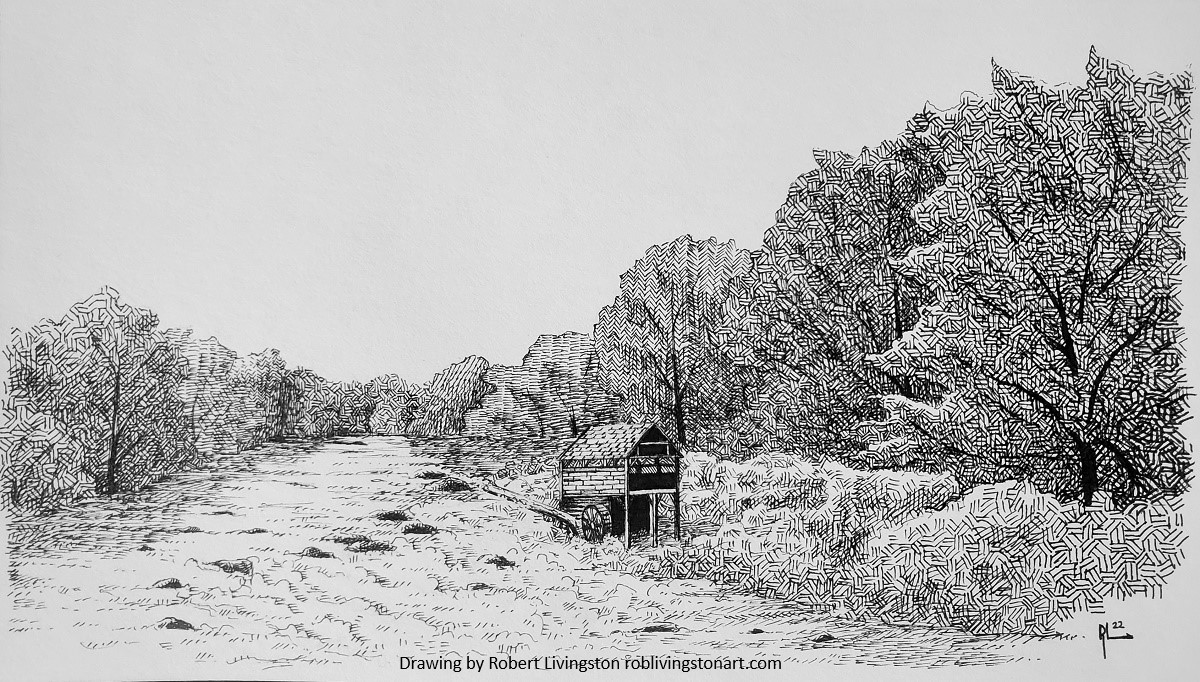Many family historians have covered information on Francis Kendall in Woburn and Thomas Kendall in Reading, Massachusetts. I won’t be re-writing, re-analyzing, or refuting those, rather I want to highlight some seldom-seen documents for the Kendalls in New England.
The first is a 1671 court record for Francis.[1] In December that year, thirteen citizens of Woburn were named in a Middlesex County court record for publicly manifesting contempt for the ordinance of infant baptism. They were also admonished for attending the assemblies of the anabaptists, which is what those who espoused “believers’ baptism,” were called. Believers’ baptism is the practice of baptizing only those who are old enough to understand and accept the tenets of church doctrine, which infants cannot. Two faiths had arisen in England which rejected the practice of infant baptism, the Baptists and Quakers (who did not practice baptism at all). Both had adherents in the colonies by the mid-1600s. Others agreed with or leaned towards anabaptism but did not join either sect. They simply held the belief while continuing to attend the predominant Congregational congregations.
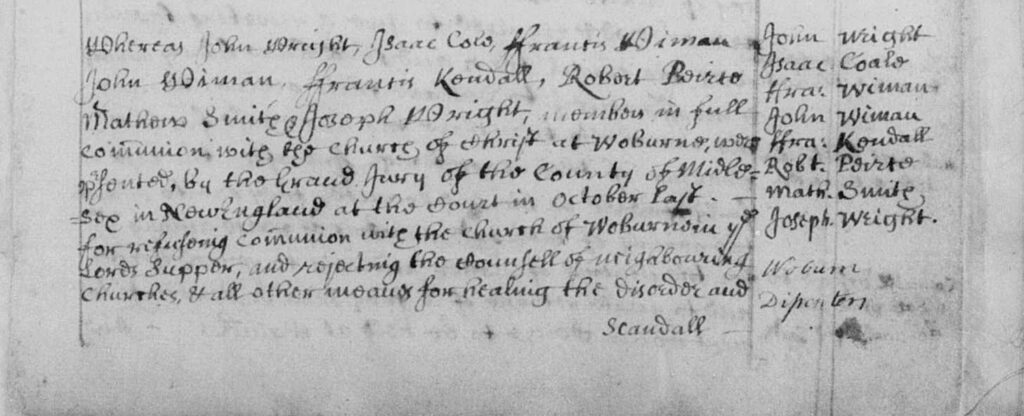
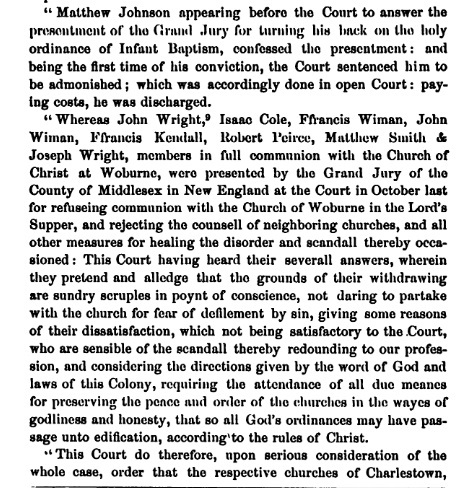
Unfortunately, this is the only instance found so far which names Francis as an anabaptist in the official records of the court. Some of those whose names were on the list appeared in later court records, including two who recanted their anabaptist beliefs and others who stayed staunchly opposed to infant baptism. Some allied themselves with a Baptist church in Boston. Other defendants, including Francis Kendall, have no follow up court documents.
One point to keep in mind is that Sherington and Newport Pagnell, Francis’s origin parishes, were embroiled in anabaptist controversy before Francis left, and it continued to be an issue there after he immigrated.[2] No specific figure has been found for the number of people in New England or England who were brought to court for anabaptist beliefs, but there are several parish and town histories which mention court actions against those who espoused believer’s baptism in the 1600s on both sides of the Atlantic. It was a time of significant religious controversy within and between denominations, and Francis was part of that.
The case of Sarah Dawes
Sarah Dawes and Daniel MacDonald (Servants to John Wyman of Woburn) were brought to court in 1656 for fornication.[3] Put simply, Sarah was carrying Daniel’s child, but he could not marry her because he had a wife and children back in Scotland.
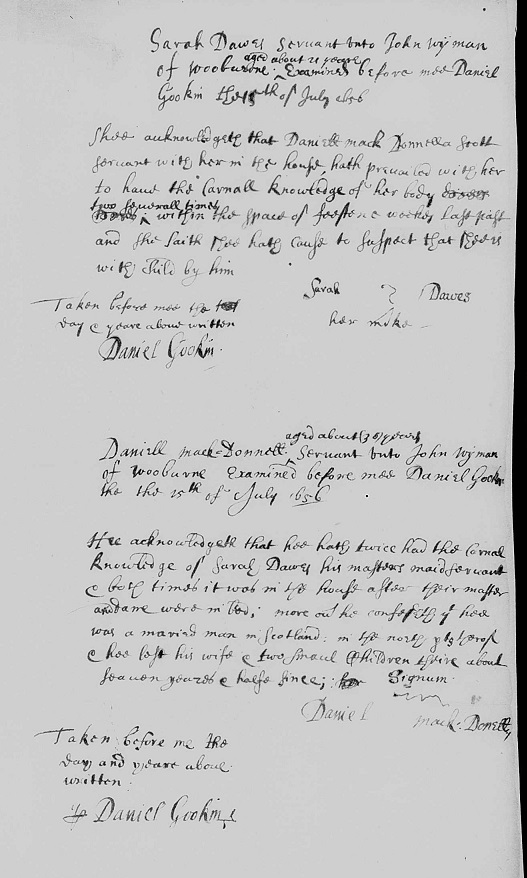
A few months later, Sarah’s name was mentioned again in court.[4] This time a writ was issued against her and sent to the constable of Woburn.
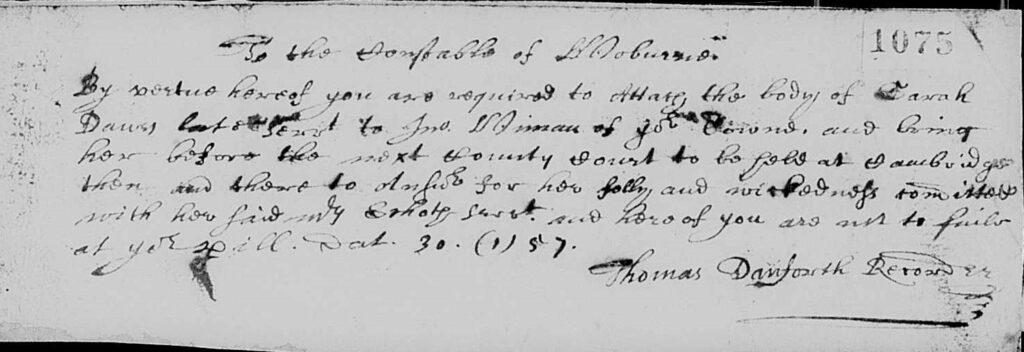
Sarah was ordered to appear at the next county court in Cambridge. The original record for her appearance was not indexed, nor was it found in a search of the following sections of court records. It may have been lost before microfilming, been unreadable as many of the faded scraps of paper in the colonial court records are, or filed in a folio so far away from the other 1657 records that hundreds of pages would have to be searched to find it. Thankfully, there is an early transcript of what followed in the Middlesex County court records.[5]
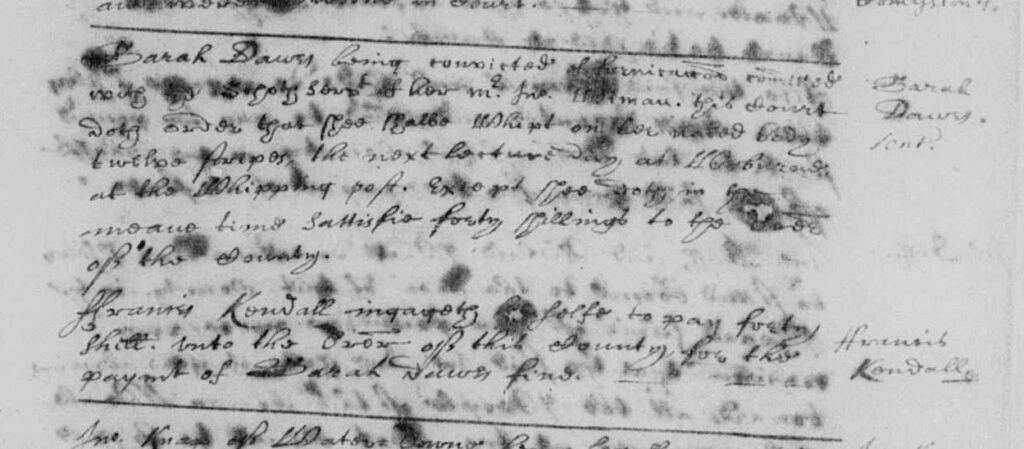
Transcription of transcript:
Sarah Dawes being convicted of fornication committed
with the schoth (Scotch) servant of her Master Jno Wiman. This court
doth order that shee shalbe Whipt on her naked body
twelve stripes, the next lecture day at Woburne
at the Whipping post. Except shee Doth in the
meane time Sattisfie forty shillings to the Trer (Treasurer)
of the County.
Francis Kendall ingageth himself to pay forty
shill. unto the Trer (Treasurer) of this County for the
payment of Sarah Dawes fine.
Though an article in The American Genealogist on Sarah Dawes listed the date of her court appearance as 7 April 1657, as does a later transcript, the earliest transcript appeared to date it on or after 17 June 1657. She would have delivered her child by either of those dates, and in the eyes of the court, she would have been ready for whatever punishment was imposed. No reason was given for Francis stepping forward to pay her fine so she could avoid the punishment, but later writers have supposed it was for kindness alone as he played no obvious part in her life nor did he seem to benefit in any way from helping her. His name and hers were not linked in any other Middlesex County or Woburn records.
The death of Thomas Kendall, brother of Francis
Accidents which might be called tragic, avoidable, or unfortunate now were all too common in early New England. Many families farmed to feed themselves or traded. Those professions and others put them on the roads with carts full of goods to transport. Such appears to be the case with Thomas Kendall.
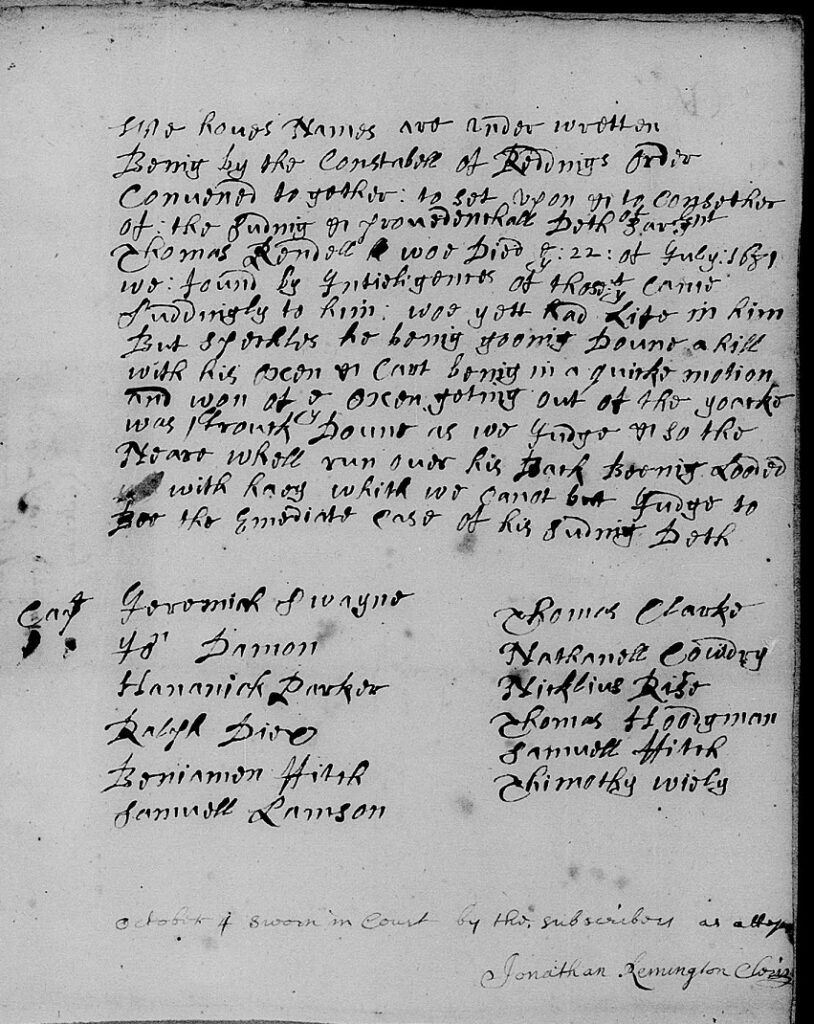
Transcription:
We houes Names are under written
Being by the Constabell of Reddings Order
convened together: to set upon & to consether
of : the Suding or provedenchall Deth of Sargent
Thomas Kendell woe Died the 22: of July: 1681
We: found by Intieligences of those that came
Suddingly to him: woe yet had Life in him
But speches he being going Doune a hill
with his oxen & cart being in a quicke motion
and won of the oxen getting out of the yoocke
was stroucke Doune as we Judge & so the
Neare whell ran over his Back Beeing Loaded
with haey which we canot but Judge to
Bee the Emediate Case of his Suding Deth
Capt Jeremiah Sawyne Thomas Clarke
Jo Damon Nathanell Cowdry
Hananick Parker Nicklins Risre
Ralph Die[ ] Thomas Hoodgman
Beniamon Fitch Samuell Fitch
Samuel Lamson Thimothy Wiely
October 4 Sworn in Court by the subscribers as att[ested} Jonathan Remington Cleri[ ]
In a nutshell, the record states the inquest into the death of Thomas on 22 July 1681 ruled it an accident. The board of twelve men interviewed the witnesses for their accounts. Thomas’s cause of death was having the loaded hay cart run over him. That was caused by one of the oxen slipping from its yoke while the cart was going quickly down a hill. That would have thrown the cart off its intended course, and possibly onto Thomas had he been walking next to it.
This may be why Thomas has two death records, one in Reading (his residence) and one in Wakefield, a nearby town.[6] The accident itself may have happened on the road between those two towns. The inquiry does not state a location for the accident.
Neither the earlier nor later transcript of the Middlesex colonial court records contains this entry on Thomas, at least not one that is easily found. Like the last record for Sarah Dawes, it could have been placed in a folio created later than the majority of the 1681 entries. Though there is some degree of organization within the court records, it is a very loose organization and the scraps of paper which make up the original records are arranged within a broad range of years. The index is helpful in a broad sense because only the primary names for each court case were recorded, and some of the records did not get indexed at all. If anyone wants to dive in and see what else might be found you can use what passes for an index:https://www.familysearch.org/search/catalog/487256?availability=Family%20History%20Library, or better yet try reading the folio headings inserted within the scrapbooked pages or do a page by page search for names of interest.
[1] Samuel Sewall, The History of Woburn (Boston, Massachusetts: Wiggin & Lunt, publishers, 1868), 154-5.
Middlesex, Massachusetts, Colonial county court records, 1636-1798: unpaginated, Francis Kendall, 1671; FHL microfilm 901,001, no item number, Folio 57; digital images, Family Search (www.familysearch.org : accessed 22 June), image 1202/1334.
[2] Frederick William Bull, “The Nonconformists, Part IV,” History of Newport Pagnell (Kettering, UK: W. E. & J. Goss, 1900).
A. C. Chibnall, “The Emergence of Non-conformity,” Sherington, Fiefs and Fields of a Buckinghamshire Village (Cambridge, UK: Cambridge University Press, 1965.
[3] Middlesex, Massachusetts, Colonial county court records, 1636-1798: unpaginated, Sarah Dawes, 1656; FHL microfilm 878221, no item number, Folio 15; digital images, Family Search (www.familysearch.org : accessed 22 June), image 373/759.
[4] Middlesex, Massachusetts, Colonial county court records, 1636-1798: unpaginated, Sarah Dawes, 1656; FHL microfilm 878221, no item number, Folio 15; digital images, Family Search (www.familysearch.org : accessed 22 June), image 528/759.
[5] Middlesex, Massachusetts, County Court Records, 1649-1699: 103, Sarah Dawes & Francis Kendall, 1657; FHL microfilm 892,251; digital images Family Search (ww.familysearch.org : accessed 27 June 2023), image 61/626.
[6] “Massachusetts Vital Records, 1620-1850,” database with images, American Ancestors (www.americanancestors.org : accessed 9 May 2023), Thomas Kendall died 1681 Reading.
“Massachusetts Vital Records, 1620-1850,” database with images, American Ancestors (www.americanancestors.org : accessed 9 May 2023), Thomas Kendall died 1681 Wakefield.
